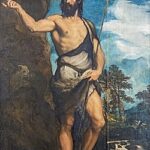
Gospel according to Luke 3:10-18
What should we do?
Have you heard, brothers and sisters, this question asked three times to John the Baptist?
“What should we do?” ask the crowds.
“What should we do?” question tax collectors.
“What should we do?”soldiers are still questioning.
The same question, formulated by very different people: either the anonymous people of a crowd, probably people of good will, or more surprisingly, civil servants feared by their abuse of power or “illegal taking of interest”. All are touched by the witness of John the Baptist and by the clear vigour of his words: “Repent,” he says, “and bring forth fruits that bear witness to your conversion! Already the axe is at the foot of the tree: any tree that does not produce good fruit will be cut down and thrown into the fire! »
With audacity and frankness, John shook up and awakened consciences: many then received the baptism of water, the first sign of a conversion of behavior and hearts.
Many, because “all the people were waiting” says the Evangelist Luke, and “all were wondering“… The legitimate expectation of the poor in search of better days, the salutary expectation of the rich, sadly encumbered by their overflow, the patient expectation of the believers who, in the night, watch for the dawn. Waiting still for the tax collectors and the soldiers, these feared and despised people who have allowed themselves to be moved: do they not also hope for a little esteem and a little love? Do they not also aspire to put their consciences at peace and to taste, at last, the happiness of doing good?
To the simple but sincere questions, the simple but demanding answers of John the Baptist: to the members of the crowd, John only reminds them of social rules, which is to love and share: “Let him who has two garments share with him who has none…” The same goes for food! »
To the tax collectors: do not cheat with your accounts and to the soldiers: do not abuse your strength! These men, these women, of all trades, from everywhere, today are us brothers and sisters, it is you, it is me…
Let us then accept to ask ourselves, in turn, the question: what can we do?
To practice law and justice, first of all:
Whatever our profession, our power, our age or our place in society, let us put back at the center of our concerns and our behavior, as a moral law inscribed in our heart, attention to each being, especially the weakest and most destitute; concern for the common good, the accomplishment of our daily task without cheating; in other words, loyal respect for justice and law.
To be peacemakers, then:
“Blessed are the peacemakers,” Jesus proclaims. “On the march, the peacemakers!”
How can we be insensitive to such calls: global over-armament is formidable: from sophisticated missiles to homemade bombs, what violence and threats! And what about our grudges and clenched fists, our endless vengeance, our murderous thoughts and words?
The battlefields are countless and often hidden in the most secret of our hearts! It is urgent to make peace, but not just any old way. Peace is much more than a flower that we would hang carelessly on the end of a gun: it requires on our part a real work of respect for law and justice, a patient work of truth and reconciliation.
Finally find joy again:
It is a sign that God is in us, in you, that each of us has found ourselves with the best of ourselves, that we are happy together.
Here is what a little girl, 7 years old, said to her parish priest, in her own words, a few years ago: “You know, Father André, God is so clever that so that you don’t forget him, he has put a little piece of Him in the heart of you.”
“Shout for joy, daughter of Zion, the Lord is with you! You no longer have to fear misfortune,” cries the prophet Zephaniah, and Saint Paul insists: “Let me tell you again: rejoice, the Lord is near!” Amen.
Father Jean-Yves Letué